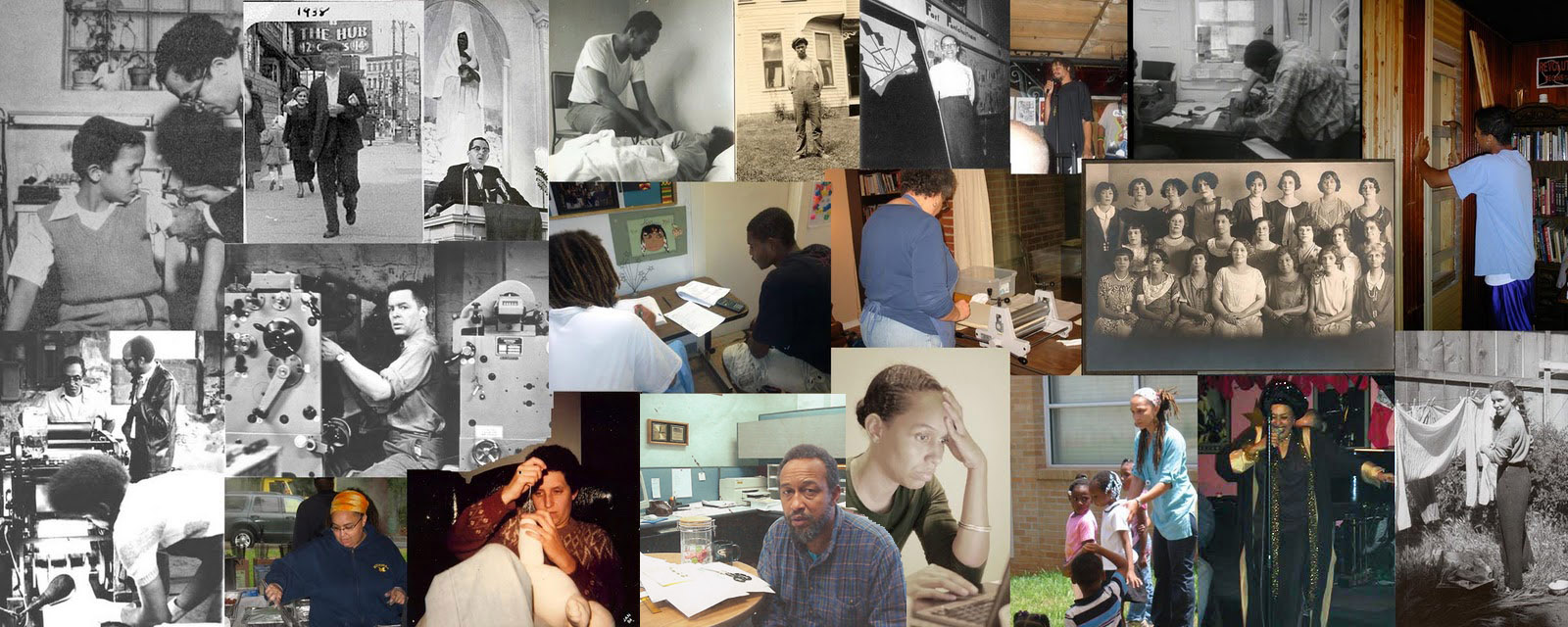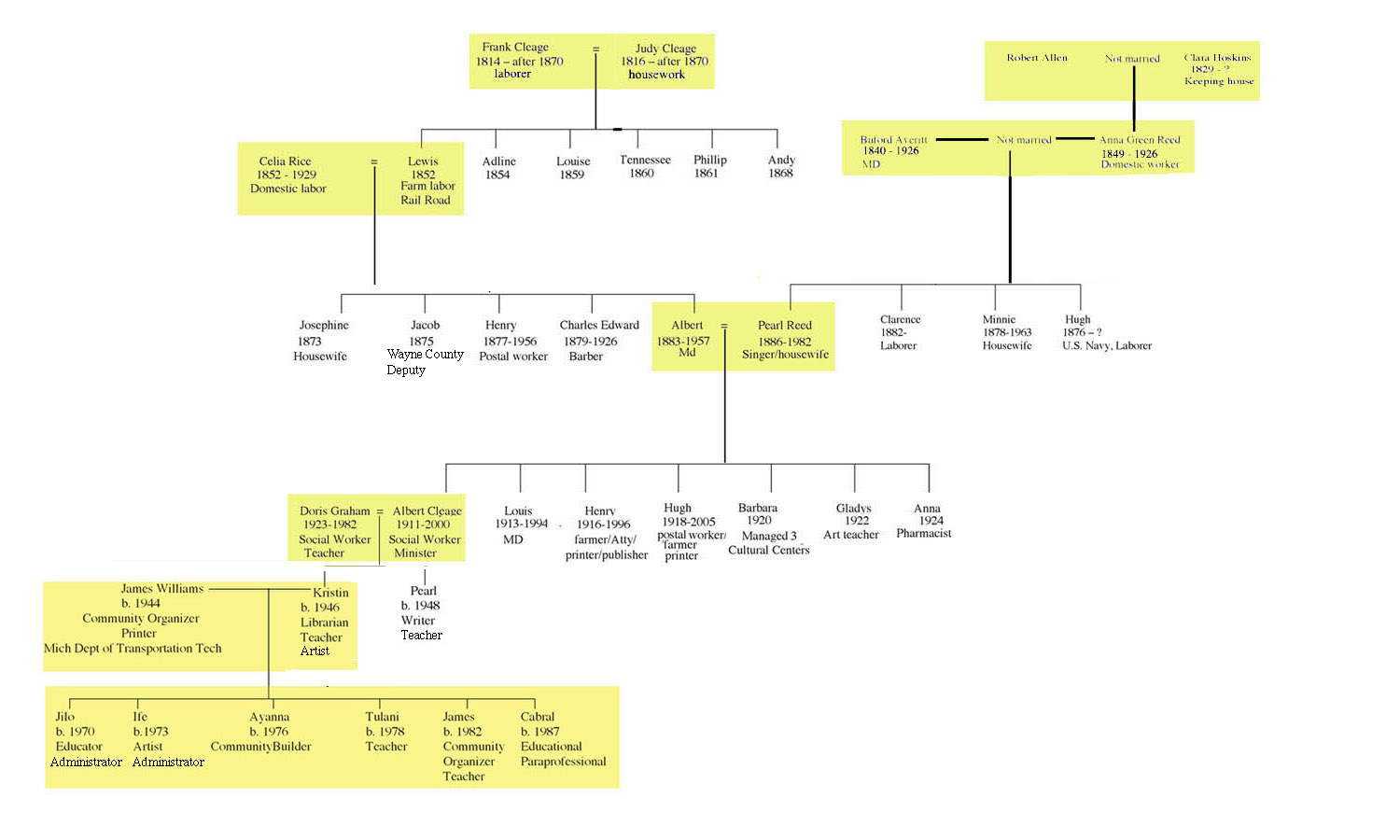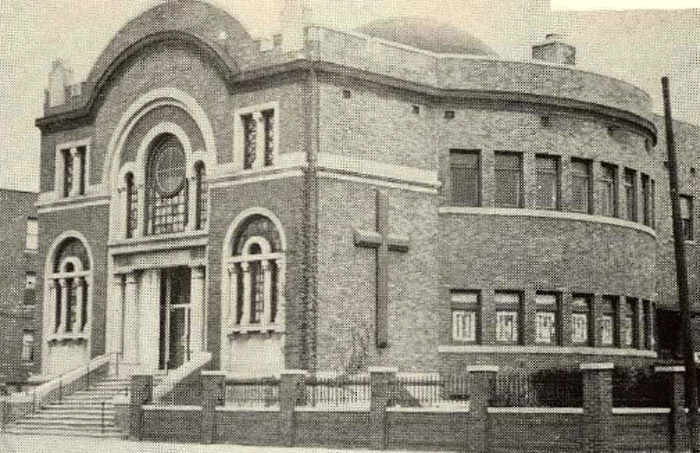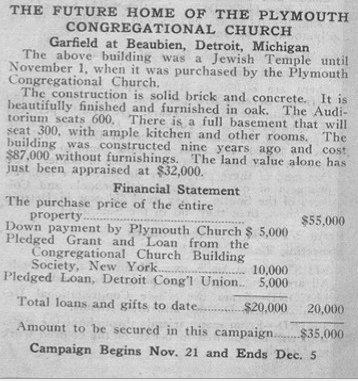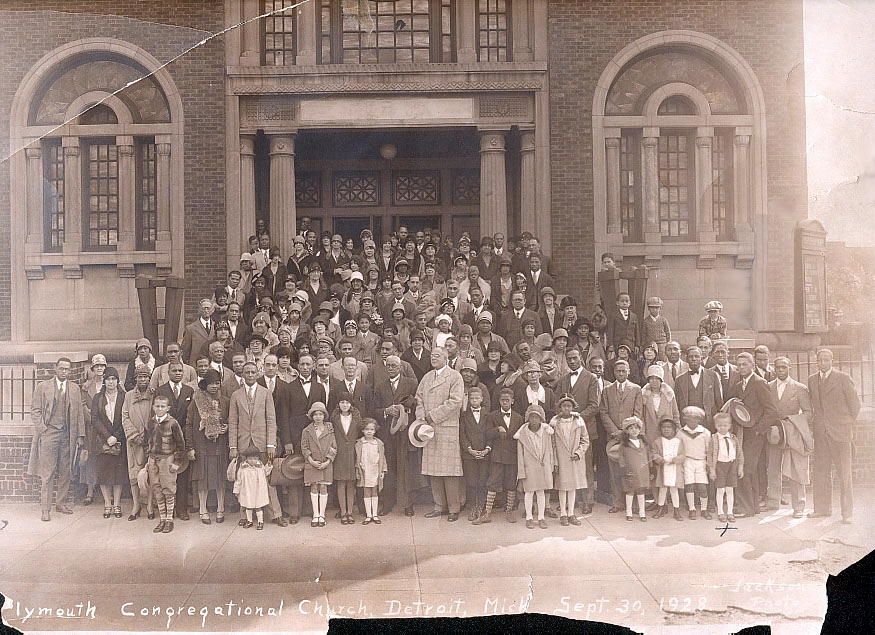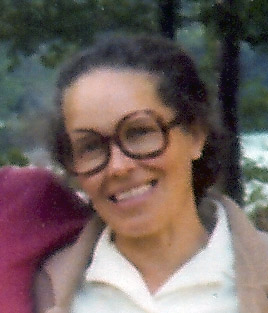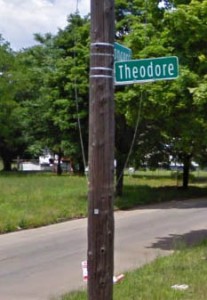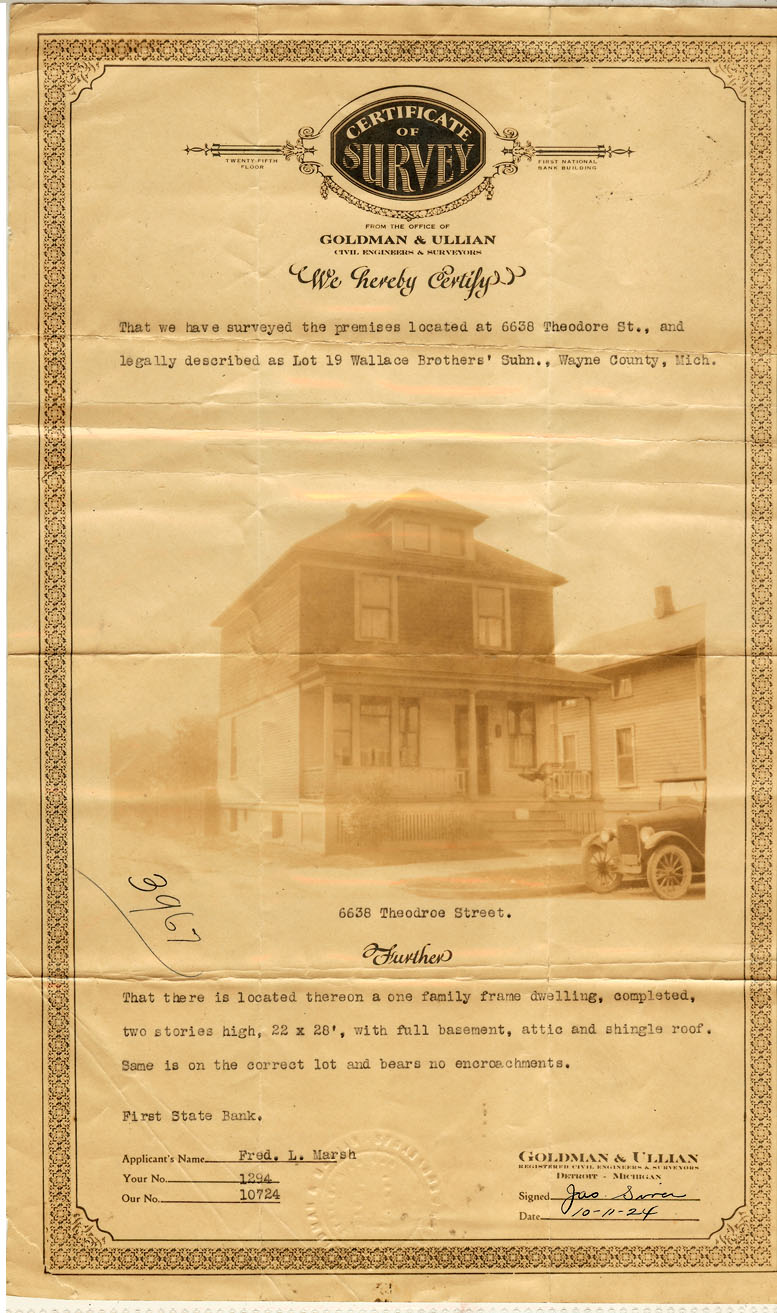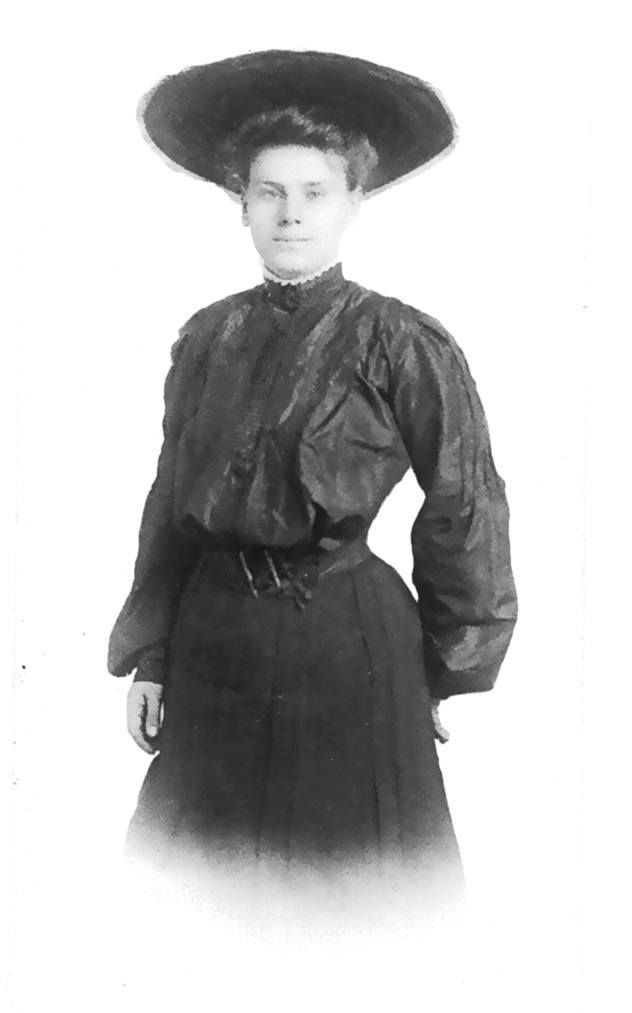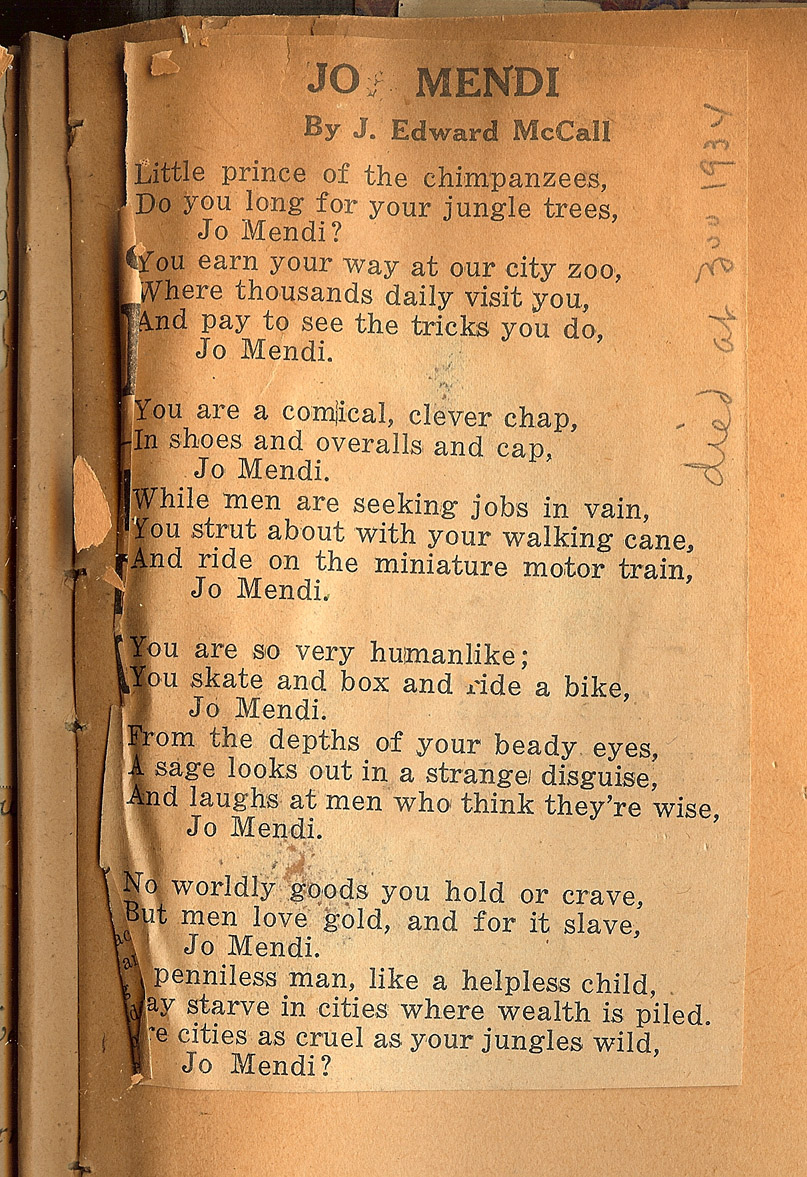Last year on Labor Day, I posted a chart of 7 generations of my family’s work history on both of my blogs. (How did I miss that I’ve been blogging for over a YEAR??) Today I’m going to repost them with a few minor changes. I can only find Lewis and Judy Cleage in the 1870 US Census and their marriage record. I am not convinced that all the children listed living with them are their children if their ages are correct. But having no other information, I put them in. I do not know what work the children did in the future. I think I will look for them again. Annie Green Reed had two husbands and four more children but I left them off of this chart. They were all laborers or farmers or housewives. Both Buford Averitt and Robert Allen come to the family tree as white men who did not acknowledge their black offspring as far as we know. Oral history and records of birth, marriage and death account for their making it onto my chart. I’ve pinpointed Buford but there are several possibilities with Robert so he has no job here. My direct line is highlighted in yellow. You can see a similar chart for my maternal side HERE.
Category Archives: Grahams
From Montgomery to Detroit, A Congregational Church
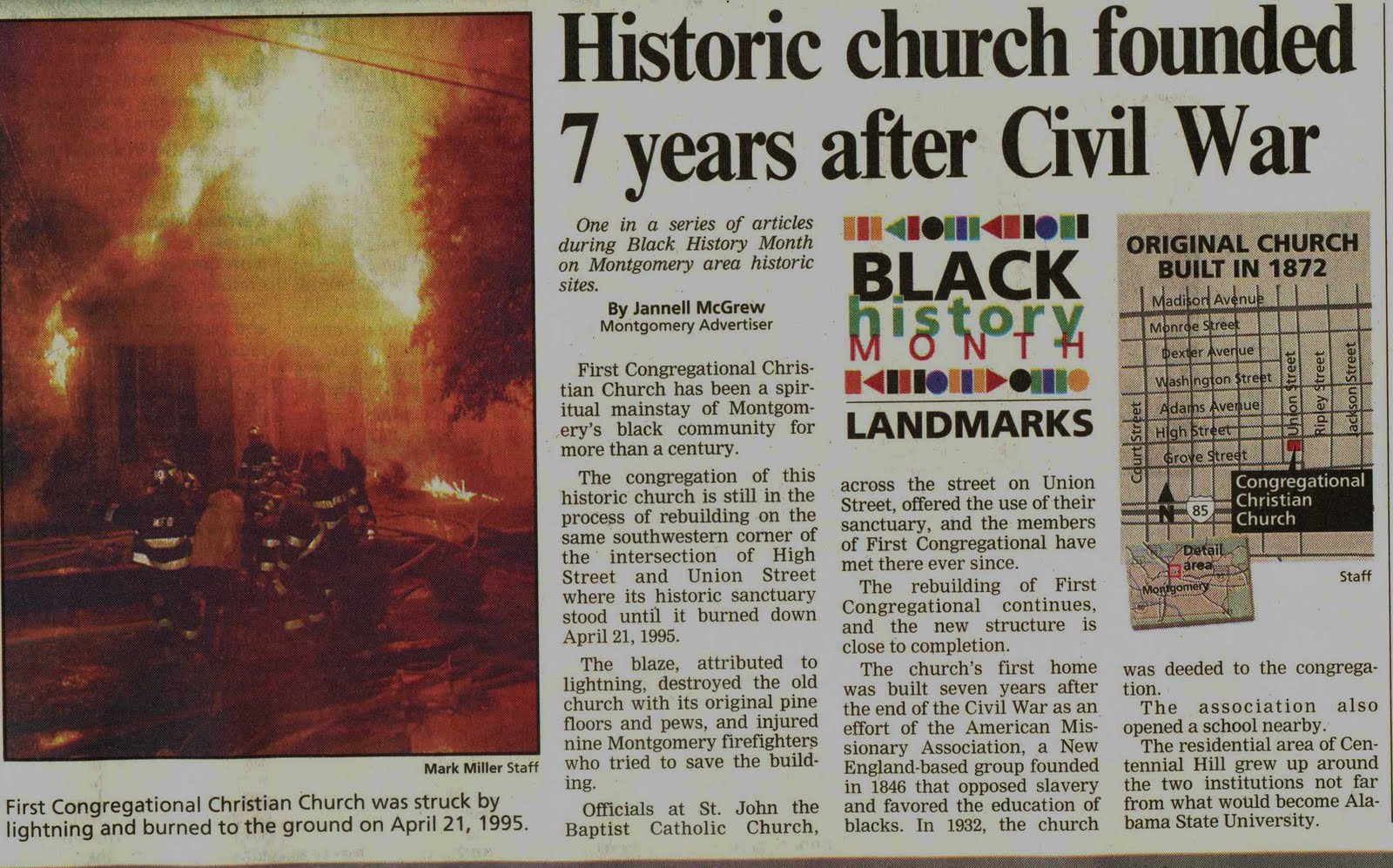
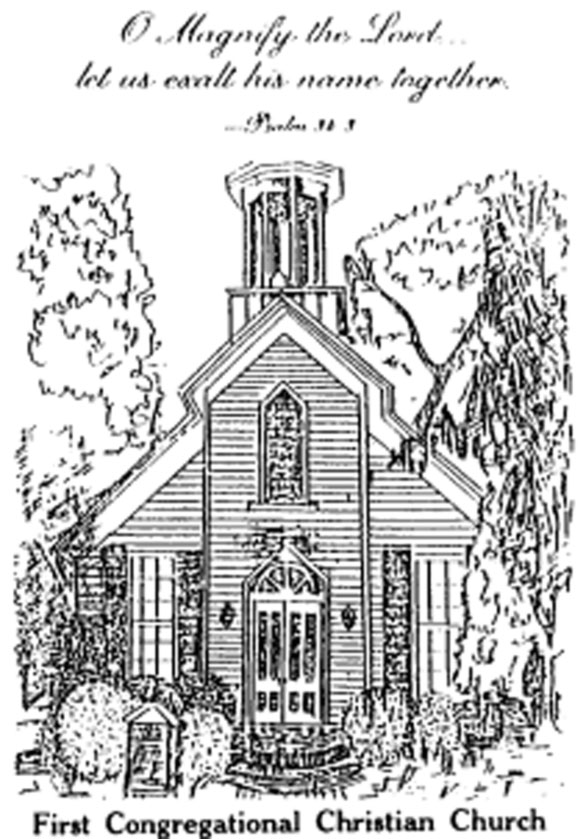 Northern Congregationalists came south to Montgomery, Alabama after the Civil War. First Congregational Christian Church was founded in 1872. They also supported a school nearby. My grandmother, Fannie, attended both the school and the church. She met her husband, Mershell, in the church.
Northern Congregationalists came south to Montgomery, Alabama after the Civil War. First Congregational Christian Church was founded in 1872. They also supported a school nearby. My grandmother, Fannie, attended both the school and the church. She met her husband, Mershell, in the church.
When Mershell Graham, my grandfather, migrated north to Detroit in 1918 many of his friends, who were also members of First Congregational Church, were also leaving segregated Montgomery. In 1919 a group of nine gathered together to form Plymouth Congregational Church. They first met in members houses and in borrowed space until they were able to purchase their own building, a former Synagogue, in 1927. They moved in, in May 15, 1927.
Plymouth had been in the building a little over a year when this photo was taken. My grandfather, Mershell C. Graham, is standing behind his daughters, Mary V. and Doris (my mother). Their cousin, Margaret McCall, is standing between them. They are in the front row, towards the left side of center. The minister, Rev. Laviscount, is standing behind Mary V. My grandmother, Fannie, had just given birth to their youngest son, Howard, so she was not able to be there.
You can read an online history of Plymouth Congregational Church of Detroit Michigan HERE.
A post about the Cradle Roll my grandmother Fannie filled out at Plymouth HERE.
You can read about Witherspoon Presbyterian Church which my paternal grandparents were founders of HERE.
Learn about the Presbyterian Churches founded by the Cleage side of my family HERE
Airports and Answers: Some Thoughts on Lighting by Pearl Cleage
Today, a guest post from my sister, Pearl Cleage, written about our mother. Doris Graham Cleage.
My favorite memory of my mother takes place in one of my least favorite environments: the airport. The Detroit airport at that. I had just flown in from D.C. and the plane was rolling slowly toward the gate, giving me ample time to worry about the next three days.
In the best of times, arrival and departure gates are not great places to play out complex emotional moments. The lighting is terrible and you’re surrounded by strangers. If you’re leaving, it’s too late to start any significant conversation, but not yet time to kiss and say good-by. If you’re arriving, first there is the interminable wait to actually deplane, the impatient jostling of people in the jet way, anxious to get to the concourse so they can jostle their way down to baggage claim, if they were foolish enough to check one.
Once there, those like me being met by friends, lovers or family members try to accomplish the almost impossible task of hugging hello without bumping noses while juggling belongings and trying not to get trampled by the jostlers who are now breathing down your neck as the bags begin to tumble to the carousel and for the merest fraction of a second, you wonder if the trip was even worth it.
And then I saw my mother. She was standing at the agreed upon meeting place, surrounded by a crowd of people, all anxiously scanning the new arrivals just like she was and my first thought was: When did she get so tiny? At just under five foot two, she was dwarfed by the people on either side, even standing between them on tiptoe, searching the sea of strangers for her baby’s face. She looked worried and frazzled and, in the weird way that happens with post-middle aged parents who are seldom seen, suddenly older; more fragile; more vulnerable.
The fragility is what startled me. When had this change occurred? How long had it been since I had actually laid eyes on her? Too long, I knew, but the distance was necessary to insure my emotional survival. I loved my mother, but like most of the women on both sides of the family, including me, she had a mean streak that could manifest itself in harsh judgments about any and everything. That made moments like the one we were now approaching even more fraught with emotional peril since the last thing I needed was a critique of my behavior. I was just emerging from a series of ill-conceived moves both professional and romantic that resulted in a tearful phone conversation during which my mother asked me the worst question in the world: What were you thinking? The next three days were supposed to give me an opportunity to respond.
Please, God, I thought, let this be a good visit. By that I meant one with a relative lack of family drama (possible, but if past is truly prologue, not likely), and maybe, if I was very patient and very lucky, a moment or two where my mother and I could sit together and talk calmly like two grown women about where we were in our lives.
Even as the thought of such a conversation popped into my head fully formed, I knew it wasn’t going to happen. My mother was not a share your deepest secrets kind of woman. She didn’t solicit your opinion because she truly didn’t care what you thought, a trait I admired even while it terrified me. She married brothers, but was so unconcerned about the resulting gossip that I never even knew her behavior was perceived as scandalous until I heard two women discussing it in the seat behind me on the bus all the way home from ballet class at Toni’s School of Dance Arts.
Like the song says, she had paid the cost to be the boss, and while there was in my mother a deep disappointment at some of the ways her life had turned out, she was prepared to live with the consequences of her decisions without complaint. Heart to heart discussions of what she might have done or said differently held no interest. On the contrary, such unsolicited opinions were certain to evoke a look of such amazed indignation and displeasure that all you wanted to do was take back your feeble offering and beg her humble pardon for having had the temerity to make a suggestion about how she lived her life.
But I had a plan. I would ambush my mother with a fresh pot of peppermint tea in a sunny corner of her kitchen. I would put on a record of Leontyne Price singing Puccini, confess my sins and gently begin to pick her brain. I wanted that conversation. No, I needed it. My life was undeniably a mess and I had exhausted my ideas about how to make it better. The moment, I decided, had arrived for my mother to tell me the womanly secrets and ancient female coping mechanisms she’d been withholding until I was ready.
Well, I was ready now. There were so many questions I needed to ask; about her, about me, about whether or not work was worth the risk and love was worth the pain. You know, those questions. The problem was, where to begin? With her journey or mine? My mother was an archeologist trapped in the body of a first grade teacher. She longed to ride camels and see the pyramids of Egypt, but had to settle for the west side of Detroit and a few weeks in Idlewild at the end of the summer, having cocktails lakeside with well manicured doctors wives, all the time dreaming of the shifting white sands of the Sahara.
Could I ask her how it felt to see so much less than you could imagine? Could I ask her why she did it? Could I ask her how she had survived the loss of all those adventures and the stifling of all those dreams? Could I ask her if she thought I could survive it, too? And last but not least, could I ask her if she still loved me even in the midst of all my flopping and floundering and foolishness?
So there it was at last. I had buried the lead, but then my mother spotted me and however long it had taken to stumble upon the real question, her face at that moment was the real answer. There was so much absolute, unconditional, unequivocal, pure, joyous love shining in her eyes as she threw up her hand and hurried toward me that the force of it made me stumble and I almost dropped my bag.
Now I am not a mystical person, but I felt my heart crack and open that day to welcome the gift she was giving me and I understood that there is only one answer to all the questions that were driving me crazy: love/love/love/love/love.
Suddenly the fantasy conversation I’d been hoping for was just that – someone else’s fantasy. My mother and I didn’t need a cozy sunlit corner and a steaming pot of peppermint tea. We had each other. Then we bumped noses and she hugged me so hard she didn’t seem fragile at all anymore, which is, of course, tangible proof that the power of love can strike anywhere, anytime. Even when the lighting is absolutely terrible.
Another post about my mother you may find interesting- GrowingUp – In Her Own Words,
Poppy’s House by Dee Dee McNeil
After writing about my grandparent’s house the other day, I came across this poem my cousin Dee Dee wrote. She said I could post it, so here it is.
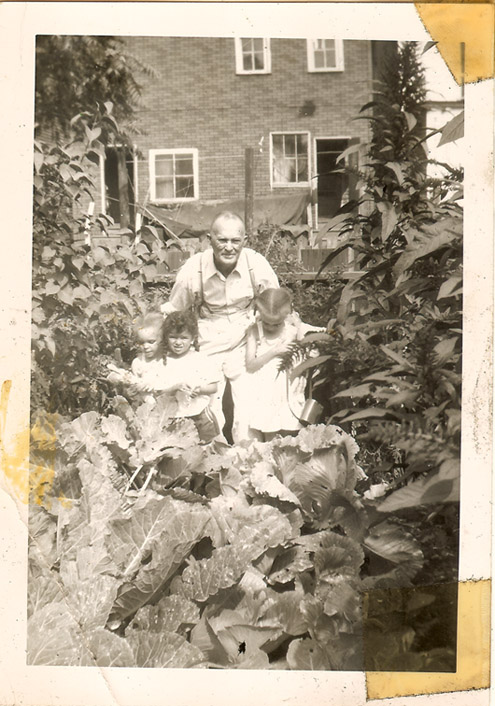
POPPY’S HOUSE
By Dee Dee McNeil
Snow ice cream
from the window sill.
A kerosene stove
for the bathroom chill.
A tub with feet
like lion paws
clung to the floor
with porcelain claws.
A house that smelled
of sachet bags,
of moth cakes, greens,
and fresh bleached rags.
A house that rang
of happy things
with warmth that only love can bring.
Poppy’s house.
© Dee Dee McNeil
T is for Theodore Street
This post continues a series using the Alphabet to go through streets that were significant in my life as part of the Family History Through the Alphabet Challenge. For this post I am bringing back a post I did a year ago for 52 Weeks of Personal Genealogy. The house at 6638 Theodore was my Graham grandparents house.
My maternal grandparents were Mershell and Fannie Graham. We called them Poppy and Nanny. They bought their house on Theodore Street on the East Side of Detroit in 1922 when my grandmother was pregnant with my mother, Doris. They lived there until the neighborhood became increasingly violent and they experienced home invasion and shots fired into the house. That was in the summer of 1968 when they bought a two family flat with my parents near the University of Detroit. So they lived in this house for 46 years.
When I was growing up we used to pick up my cousins on summer Saturdays and spend the day at my grandparents. We had Thanksgiving and Christmas dinners there and backyard meals for the summer holidays.
There was a front porch across the front but by the time we came along there was no porch swing and we never sat or played in the front. The front door had a full window. the window to the right of the front door was the “hall way” it was divded from the living room by wooden pillars. On the hall side there was a table that held the high school graduation photos of my mother and her sister, a lamp and underneath a brass bowl that held last years Christmas cards. Next to it was my grandmother’s rocking chair. The door to the kitchen was behind that and the stairs to the second floor were behind the table. At the foot of the stairs, beside the single window, was a table with the telephone. The telephone sat on a small table my grandfather built, on the landing. During the day, it came down to the little table and at night it went back to the landing. But wait, I think I can show you better then tell you. Downstairs on the first and upstairs below. No photos taken upstairs. There was a great basement too that included my grandfather’s workshop, a large converted coal furnace and a pantry.
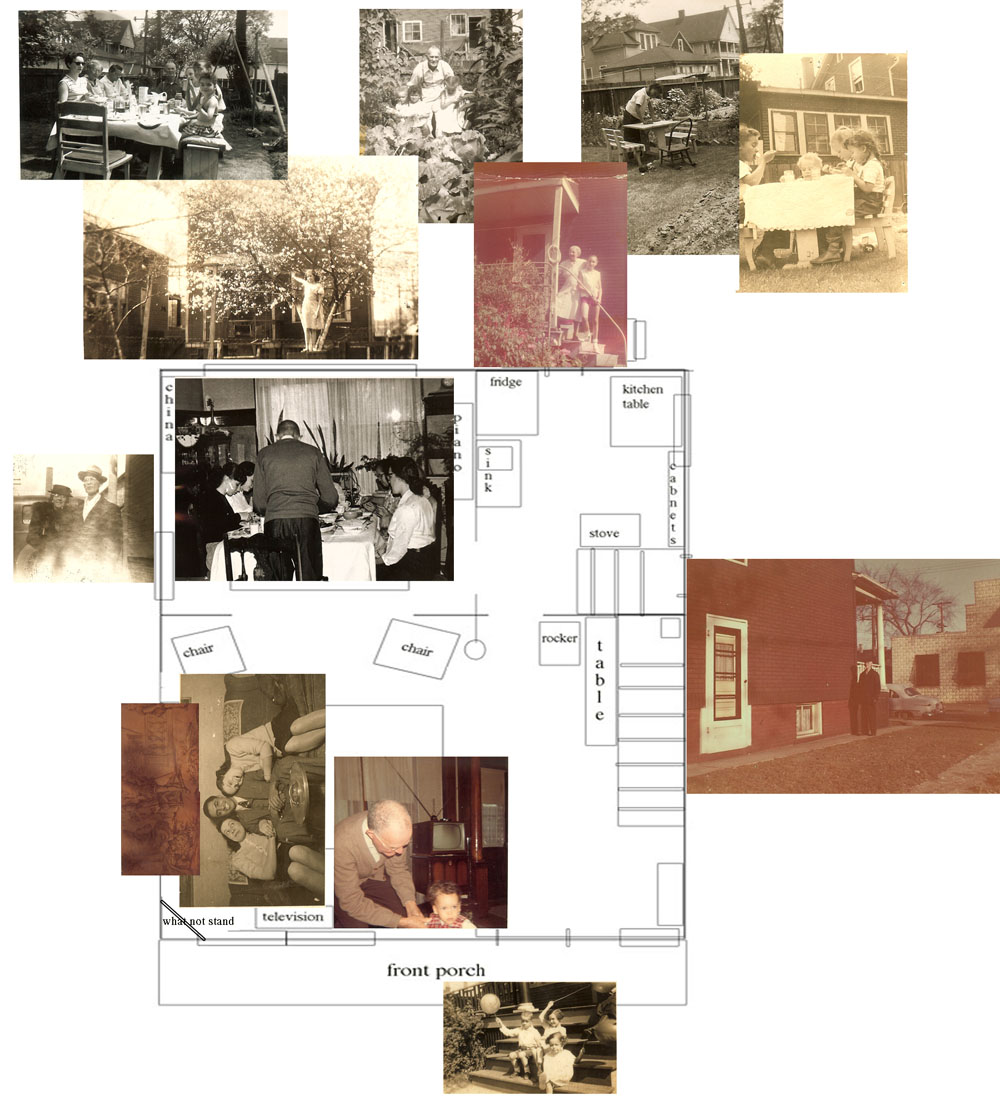
When my grandparents moved in 1968, the people who owned the factory across the street bought the house and tore it down. This is what the spot looked like last time I was in Detroit taking photographs of family places.
To read more about the Brass bed and see a photograph of it – Dollhouse update.
Fannie Mae Turner, Enumerator 1910
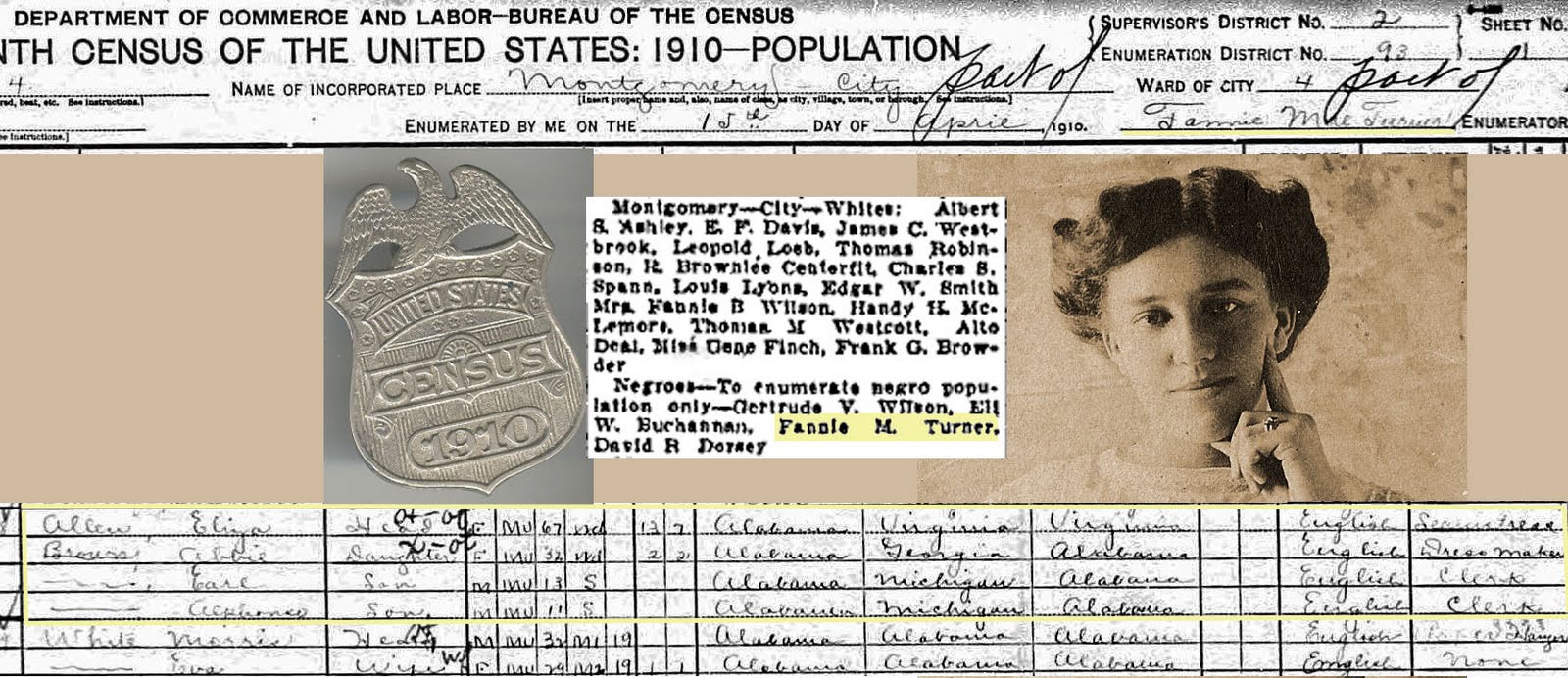
After reading My Grandfather was an Enumerator on the blog ABT UNK, I decided to write something about my grandmother Fannie M. Turner who was an enumerator for the 1910 US Census in Montgomery, Alabama. She was 22 and lived with her mother and younger sisters in Montgomery, although not in the district she enumerated. Her grandmother Eliza Allen lived in the district. It was looking at the entry for Eliza that I first noticed that my grandmother was the enumerator. Recently I found a newspaper article online about the appointed census takers that said in part:
“Montgomery – City – Whites: Albert S. Ashley, E.F. Davis, James C. Westbrook, Leopold Loab, Thomas Robinson, R. Brownlee Centerfit, Charles S. Spann, Louis Lyons, Edgar W. Smith, Mrs. Fannie B. Wilson, Handy H. McLemore, Thomas M. Westcott, Alto Deal, Miss Gene Finch, Frank G. Browder. Negroes–To enumerate negro (sic) population only–Gertrude V. Wilson, Eli W. Buchanan, Fannie M. Turner, David R. Dorsey.”
Fannie M. Turner began work April 15, 1910 and enumerated her Aunt Abbie and her Grandmother Eliza on pg 2. She finished on April 26. Mrs. Fannie B. Wilson (white) completed the enumeration of Montgomery, Ward 4 by counting the white residents on several pages after that. As noted in the newspaper article, Negro enumerators could only count Negros. I wonder how that worked. Did my grandmother go to the door, note that they were white and tell them someone else would return to count them later? Did the neighbors alert her? Since she was already familiar with the neighborhood, did she already know where the white people lived or did all the white residences live in the same area?
My grandmother was a working woman who managed her Uncle Victor’s grocery store from the time she graduated from State Normal School until she married my grandfather in 1919. Wish I knew the stories she must have had to tell about that two weeks of counting the citizens in Ward 4.
Abbie Allen Brown
Here are my mother’s memories of her great Aunt Abbie, who lived with my grandparents until I was twenty. Aunt Abbie became very frail and was no longer mobile. My aging grandparents were unable to care for her and she was sent to a nursing home where she died several months later.
Abigail Allen Brown
By Doris Graham Cleage
Aunt Abbie married a Mississippi Riverboat gambler, swarthy and handsome and no good, who stayed home on two visits long enough to give her two sons and then sent her trunks of fine clothes to wear or to sell to take care of herself and the boys. Whenever she talked about him she sounded like she hated him. She resented the lack of money. Said once the oldest boy Earl (named for his father) screamed for days with toothache and she could not take him to the dentist, who didn’t want any fancy clothes or jewelry. She resented raising the children alone. I got the feeling she hated them and they hated her and she resented him being off having a good time while she stayed home with the problems.
She talked about him in a completely different way than she talked about her Jewish policeman, who bought her a house on Ripley St. Spent much time there, for whom she loved to cook and keep house. She came to live with Mother to take care of Daddy(!) so Mother could come to Springfield and help me when Kris was born. In later years when they lived on Fairfield, Mother and Daddy used to argue about this and they would call me in to referee. He’d say he took Aunt Abbie in out of the goodness of his heart like all the rest of her family. And she was not supposed to stay on (!) them forever but was to go to live with Aunt Margaret. Mother would say Aunt Abbie came to take care of him because (here she would make a mouth at me) he could not take care of himself and work even though he could cook better than she and do everything else in the house too. (I think we are always angered at the way men can say this is the limit. I can’t or I won’t do this or that and we seem to have lives where you do what is to be done since you have no one who will hear you if you say you can’t or won’t. Hold my hand Charlie Brown!) And that he knew very well she was going to live with them and visit Margaret occasionally. Mother was right. He said Aunt Abbie came to have cataracts operated on and to be taken care of. He was wrong. Her eye operations came years later. He said to me once that he had always taken care of Mother’s people and she would have nothing to do with his. I know how Grandmother depended on him to fix things around their house. And he was most agreeable and I always thought he loved it. They made over him when he came with his box of tools. I was always there as helper, but he got very tired and mistreated about having both Alice and Aunt Abbie to take care of. He didn’t like either one. But I never could get him to send them to a nursing or residence home to live. He always said “What would people say if I did that?” When people talk like that I give up because they are obviously making the choice they prefer.
Back to Aunt Abbie. She loved to cook and do everything else about the house. Mother would not let her do anything except clean her own room and do her own washing and ironing…..and Mother hated everything about housekeeping except cooking; but she said her husband expected her to take care of him and his house and (she didn’t say this,) she’d be damned it she’d let anyone else do it as long; as she could. I couldn’t talk to her about it.. Aunt Abbie tried to get her sons to let her come to NY and live with them. They wouldn’t even answer her letters. Sad.
Note: I remember her son Alphonso visiting several times. Aunt Abbie was fixing him tongue because he really like it. KCW
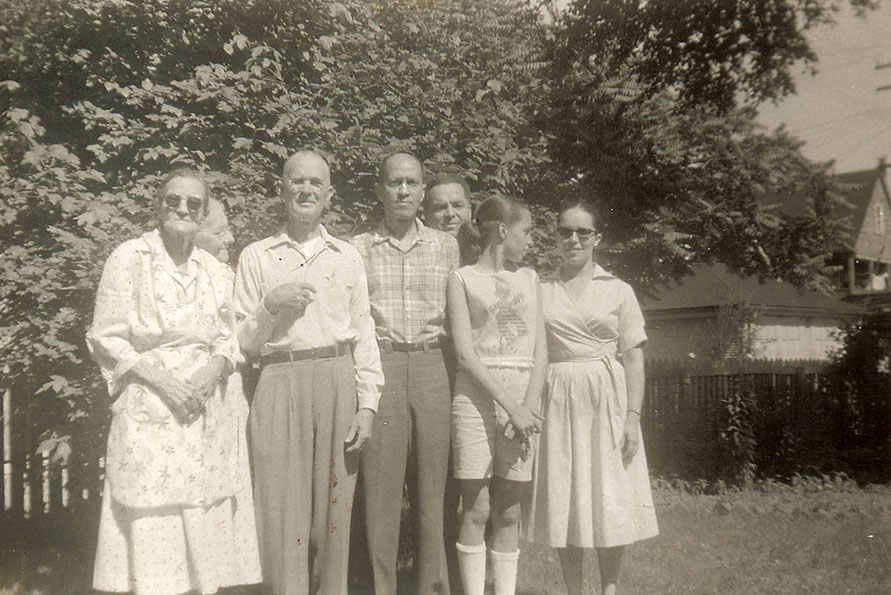
Poppy Was Cool – 1916
My sister recently found a stash of old family photos that she had forgotten she had. She was nice enough to bring them over to me to add to the collection. Among those photographs were these of my maternal grandfather, Mershell C. Graham called Poppy by us. When these photos were made, he was Shell and apparently quite dapper.
 In the first picture we see him perched on a fence with a tower in the background. It looks sort of like a bell tower.
In the first picture we see him perched on a fence with a tower in the background. It looks sort of like a bell tower.
 In the next photo MC seems to be holding an umbrella and wearing tails. On the other hand it looks like it’s pretty big for an umbrella. In the back is a wooden fence, but not the same one as in the tower photo. There are several people walking up and down the street too.
In the next photo MC seems to be holding an umbrella and wearing tails. On the other hand it looks like it’s pretty big for an umbrella. In the back is a wooden fence, but not the same one as in the tower photo. There are several people walking up and down the street too.
 In the third photo my grandfather is swinging in the woods. In the background there is something that could be a house or other building.
In the third photo my grandfather is swinging in the woods. In the background there is something that could be a house or other building.
These photos were around 1916 in Montgomery, Alabama. I think.
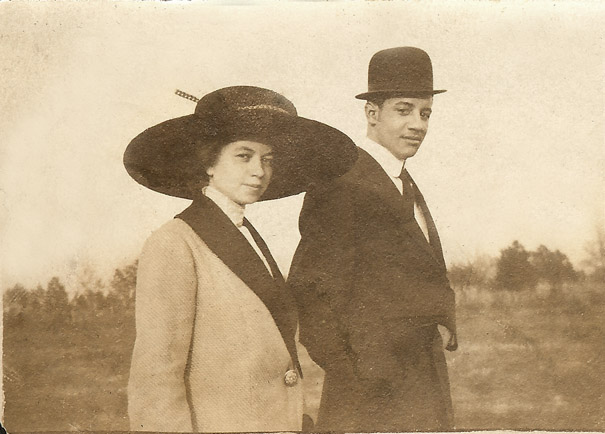 The last photo I include because they are such a cool looking couple. I know nothing beyond they were my grandfather’s friends.
The last photo I include because they are such a cool looking couple. I know nothing beyond they were my grandfather’s friends.
For other Sepia Saturday entries with towers in them, click HERE. Other posts about my MC Graham: The Proposal, The Proposal Accepted, Poem for Poppy, Mershell’s Notebook and Poppy Could Fix Anything.
Poems by James E. McCall
The first poem was written on the death of Howard Graham, my grandparent’s youngest son. He died in 1932 from complications of scarlet fever. You can read more about it here My Grandmother’s Loss. James McCall and my grandmother Fannie were first cousins, their mothers were sisters.
Little pal, do you know how we miss you,
Since you journeyed into the West?
Once again in dreams we kid you,
And press you close to our breast.
Your hair was bright as the sunshine,
Your voice like the music of birds,
Your eyes were blue as the heavens,
And your smile too precious for words.
Goodnight, little pal; sleep sweetly
Till the dawn of the morning light;
May the angels of God watch o’er you–
Good-night, little pal, good-night.
In memory of Howard A. Graham,
By his pal, J.E.M.(James Edward McCall)
3/5/32
_________________________
The second poem is transcribed from the page of poems in my grandmother’s scrapbook. She pasted one thing over another, sometimes obscuring the original items on the page. The clippings are browning and fragile.
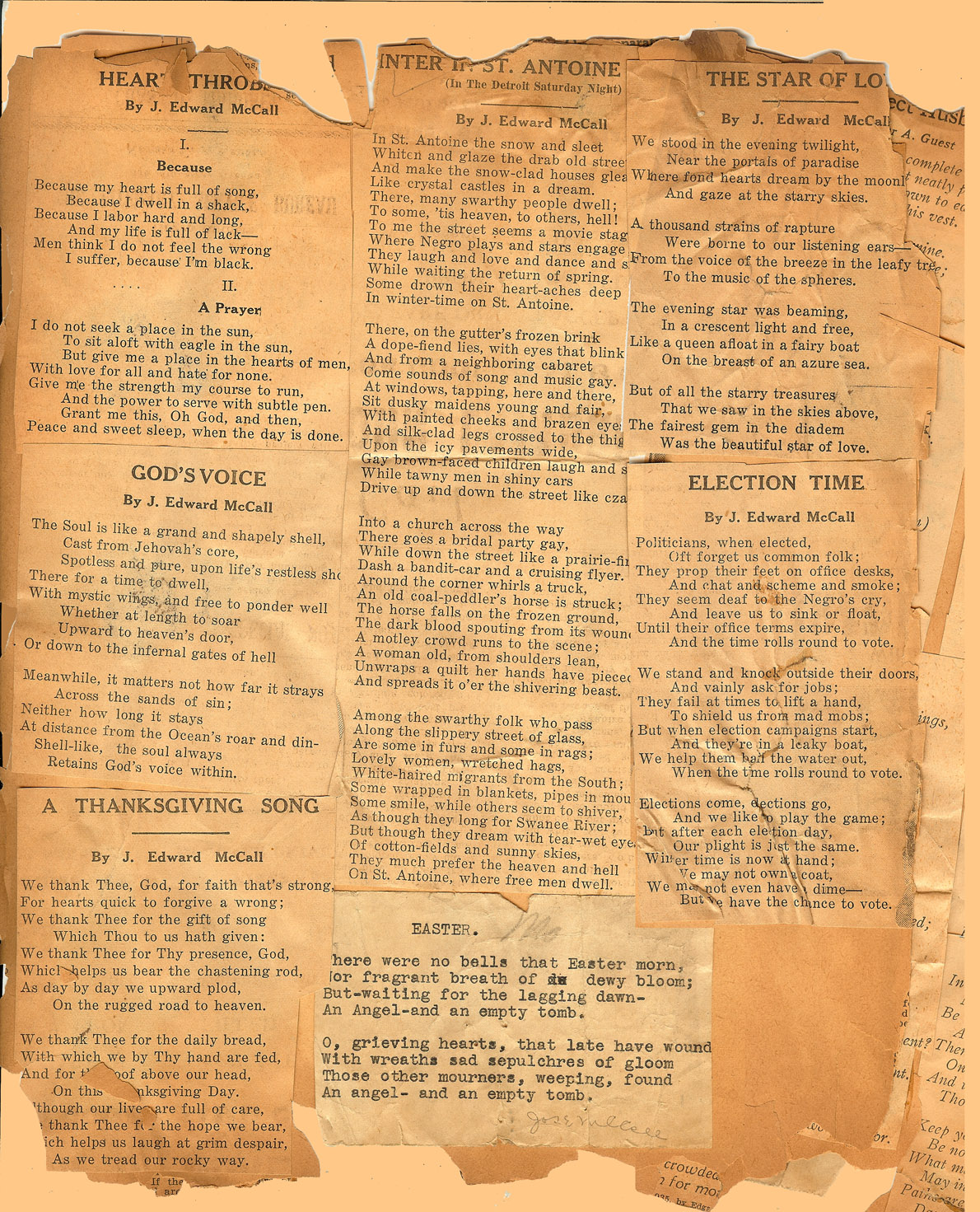 Winter in St. Antoine by James McCall
Winter in St. Antoine by James McCall
(In The Detroit Saturday Night)
In St. Antoine the snow and sleet
Whiten and glaze the drab old street
And make the snow-clad houses gleam
Like crystal castles in a dream.
There, many swarthy people dwell;
To some, ’tis heaven, to others, hell!
To me the street seems like a movie stage
Where Negro play and stars engage.
They laugh and love and dance and sing
While waiting the return of spring.
Some drown their heart-aches deep
In winter time on St. Antoine.
There, on the gutters frozen brink
A dope-fiend lies, with eyes that blink
And from a neighboring cabaret
come sounds of song and music gay.
At windows, tapping, here and there,
Sit dusky maidens young and fair,
With painted cheeks and brazen eyes.
and silk clad legs crossed to the thigh
Upon the icy pavements wide,
Gay brown-faced children laugh and slide
While tawny men in shiny cars
Drive up and down the street like czars.
Into a church across the way
There goes a bridal party gay.
While down the street like a prairie-fire,
Dash a bandit car and a cruising flyer.
Around the corner whirls a truck,
An old coal-peddler’s horse is struck;
The horse falls on the frozen ground,
The dark blood spouting from its wound.
A motley crowd runs to the scene;
A woman old, from shoulders lean,
Unwraps a quilt her hands have pieced
And spreads it o’er the shivering beast.
Among the swarthy folk who pass
Among the slippery street of glass,
Are some in furs and some in rags;
Lovely women, wretched hags,
White-haired migrants from the South;
Some wrapped in blankets, pipes in mouth;
Some smile while others seem to shiver,
As though they long for Swanee River;
But though they dream with tear wet eyes
Of cotton-fields and sunny skies.
They much prefer the heaven and hell
On St Antoine, where free men dwell.
______________________________
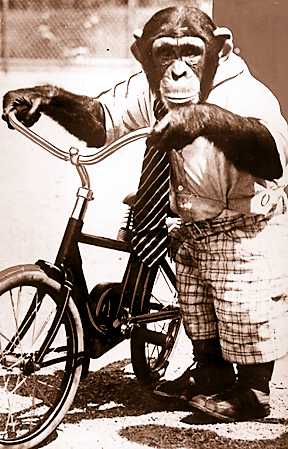
You can read more about McCall in this post – James Edward McCall, Poet and Publisher.
Before Kris Came – My Mother 1946
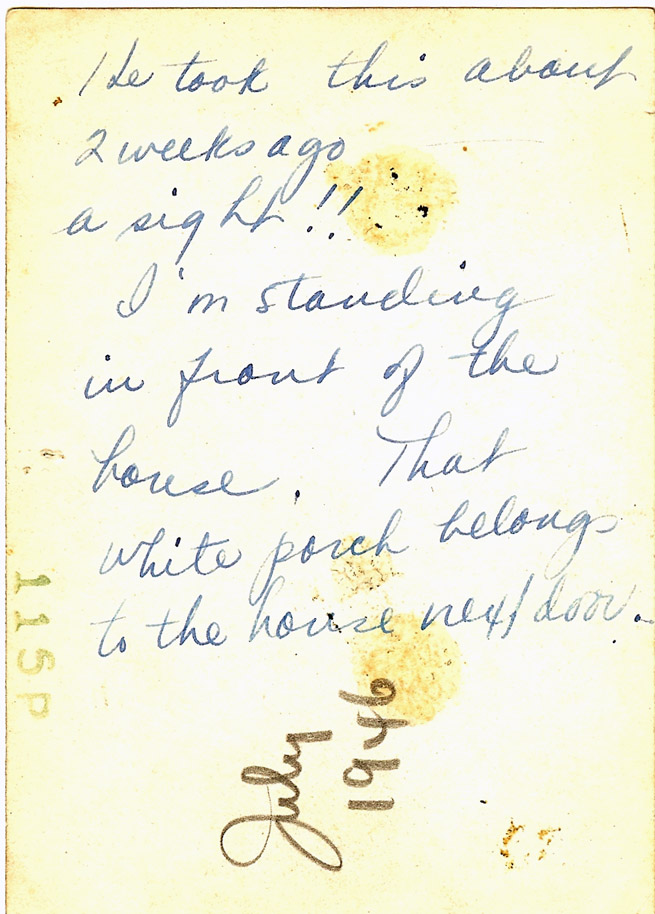 To read more about my mother click Growing Up-In Her Own Words.
To read more about my mother click Growing Up-In Her Own Words.
